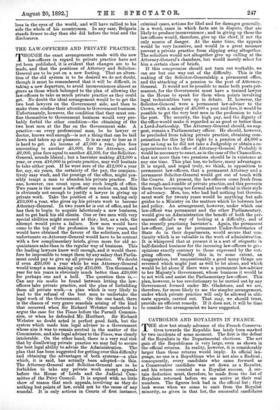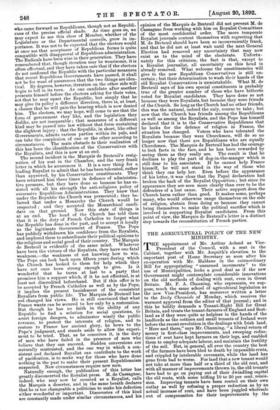CATHOLICS AN]) ROYALISTS IN FRANCE.
THE slow but steady advance of the French Conserva- tives towards the Republic has lately been marked by two incidents of some moment. The first is the defeat of the Royalists in the Departmental elections. The net gain of the Republicans is very large, even as shown in the official returns. In reality, however, it is considerably larger than these returns would imply. In official lan- guage, no one is a Republican who is not also a Radical ; consequently, every candidate who came forward as a Conservative candidate was set down as a Royalist, and his return counted as a Royalist success. A cer- tain deduction must, therefore, be made from the list of Royalists returned before we can arrive at their real numbers. The figures look bad in the official list • they look worse when we come to omit from the Royalist minority, as given in that list, the successful .candidates who came forward as Republicans, though not as Republi- cans of the precise official shade. As time goes on, we may expect to see this class of Member, whether of the Legislature or the Departmental councils, grow in im- portance. It was not to be expected that the electors would at once see that acceptance of Republican forms is quite compatible with disapproval of Republican administration. The Radicals have been wise in their generation. They have remembered that, though iteration may be wearisome, it is often effectual, and they have taken care that if the electors do not confound the Republic with the particular measures that recent Republican Governments have passed, it shall not be for want of assurances that the two things are iden- tical. By degrees, however, iteration on the other side will begin to tell in its turn. As one candidate after another presents himself before the electors asking for their votes, not that he may upset the Republic, but simply that he may give its policy a different direction, there is, at least, a chance that he will gain the hearing which is now denied him. The electors, we may hope, will come to see that the form of government they like, and the legislation they dislike, are not inseparable ; that measures of a different kind may be passed into law without that form sustaining the slightest injury ; that the Republic, in short, like other Governments, admits various parties within its pale, and can take the complexion of one or the other according to circumstances. The main obstacle to their realisation of this has been the identification of the Conservatives with the Royalists, and this is now at an end. The second incident is the Marquis de Breteuil's resig- nation of his seat in the Chamber, and the very frank letter in which he announces it. It is a rare thing for a leading Royalist to admit that he has been tolerated, rather than approved, by his Conservative constituents. They have returned him three times in defiance of administra- tive pressure, but they have done so because he has re- sisted with all his strength the anti-religious policy of successive Republican Administrations. They knew that under the Republic the Church was persecuted ; they be- lieved that under a Monarchy the Church would be respected ; and they accepted the Monarchical candi- date on that ground. Now this state of things is at an end. The head of the Church has told them that it is the duty of French Catholics to forget what -the Republic has done in the past, and to accept it loyally as the legitimate Government of France. The Pope has publicly withdrawn his confidence from the Royalists, and implored them to subordinate their political opinions to the religious and social good of their country. The Marquis de Breteuil is evidently of the same mind. Whatever have been the virtues of the Royalists, they have one fatal weakness,—the weakness of not knowing how to win. 'The Pope can look back upon fifteen years during which the Church has looked to them for help which they have not once been strong enough to give. Is it wonderful that he turns at last to a party that promises him a support which, if it be not effectual, is at least not discredited beforehand. But if this offer is to be accepted by French Catholics as well as by the Pope, it implies the present banishment of the consistent Royalists from public life. The Marquis de Breteuil has not changed his views. He is still convinced that what France wants can be secured to her only by a restoration. But though he has no faith in the ability of any Republic to find a solution for social questions, to avert foreign dangers, to administer wisely the public revenue, to protect the interests of religion, and to restore to France her ancient glory, he bows to the Pope's judgment, and stands aside to allow the experi- ment to be tried. That, as he conceives it, is the duty of men who have failed in the presence of men who believe that they can succeed. Sudden conversions are naturally mistrusted, and the one way in which a con- sistent and declared Royalist can contribute to the work of pacification, is to make way for those who have done nothing in the past to make their present Republicanism suspected. New circumstances require new men. Naturally enough, the publication of this letter has greatly disconcerted the Royalist press. M. de Cassagnac, indeed, who may now be counted as a Royalist, calls the Marquis a deserter, and in the same breath declares that he is too changeable a politician to make his defection either wonderful or important. Discoveries of this kind are constantly made under similar circumstances, and his opinion of the Marquis de Breteuil did not prevent M. de Cassagnac from working with him on Royalist Committees of the most confidential order. The more temperate Royalist journals content themselves with regretting that M. de Breteuil should have been so inconveniently frank, and that he did not at least wait until the next General Election had removed any uncertainty that may now exist an to the mind of the electorate. lInfortu• nately for this criticism, the fact is that, except to a Royalist journalist, all uncertainty on this head is already removed. What welcome the constituencies will give to the new Republican Conservatives is still un- certain; but their determination to wash their hands of the old Royalist Conservatives is unmistakable. What M. de Breteuil says of his own special constituents is probably true of the greater number of those who have hitherto voted for Royalist candidates. They have done so not because they were Royalists, but because they were friends of the Church. So long as the Church had no other friends, this was the natural, indeed the only, course to take • but now that the Church has friends among the Republicans as well as among the Royalists, and the Pope has himself declared that it is to the Conservative Republicans that he looks for the defence of religion in France, the situation has changed. Voters who have tolerated the Royalists because they were Churchmen, will do so no longer now that there are Republicans who are equally Churchmen. The Marquis de Breteuil has had the courage to look facts in the face, and he has been rewarded by seeing them as they really are. The result is that he declines to play the part of dog-in-the-manger which is still dear to his associates. If he cannot help France himself, he will not stand in the way of those who think they can help her. Even before the appearance of his letter, it was clear that the Papal declaration had broken the back of the Royalist Opposition ; but since its appearance they are seen more clearly than ever to be the defenders of a lost cause. Their active support does the Church harm rather than good. It makes some, perhaps many, who would otherwise range themselves on the side of religion, abstain from doing so because they cannot bring themselves to make the political sacrifice which is involved in supporting Royalist candidates. From this point of view, the Marquis de Breteuil's letter is a distinct step towards the reconstitution of French parties.



































 Previous page
Previous page